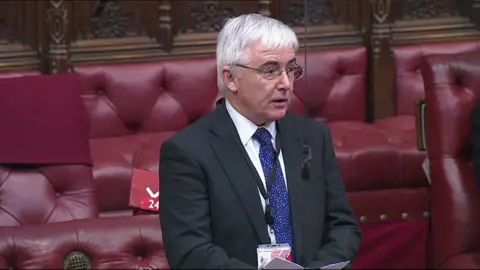Tory peer breached code of conduct with letter to judges
 HoL
HoLA Conservative peer has apologised to the House of Lords and the judiciary after breaching the code of conduct.
Lord Freud, a former welfare minister, wrote a letter to judges presiding over the trial of the disgraced former Conservative MP, Charlie Elphicke.
The Lords Commissioner for Standards has found the peer had "failed to act on his personal honour".
Lord Freud said he acted on a matter of principle, but accepted he should not have added his name to the letter.
Lord Freud was rebuked last December along with a group of Conservative MPs for lobbying judges during the trial of Charlie Elphicke, who was subsequently jailed for two years for sexually assaulting two women.
They had written to the judges over the potential public release of the statements they had given to a court in support of their former colleague.
Journalists had asked for disclosure of the character statements, which were considered by a judge as she decided on Elphicke's sentence.
The Lord Chief Justice of England and Wales, Lord Burnett, said at the time there had been "nothing quite like" the letter - although it was not the first time an MP had tried to lobby a judge behind the scenes.
In a short personal statement, Lord Freud said his motive in putting his name to the letter was "purely to alert the judiciary to what I considered an important issue of principle".
He added: "I recognise that it was not my place to do so and I should not have added my name to the letters. I apologise to the House and the judiciary."
Personal honour
The Lords Commissioner for Standards, who conducted an investigation into the matter, concluded that Lord Freud had sought to use his position as a parliamentarian in private correspondence to influence an active court case.
She said this conduct was outside the standards of conduct expected of peers and amounted to a "failure to act on his personal honour".
In her report, the Commissioner accepted Lord Freud's explanation that he was acting to assist members of the public rather than for his own benefit.
She acknowledged that he now regrets signing the letters and so no further action other than an apology was recommended.
